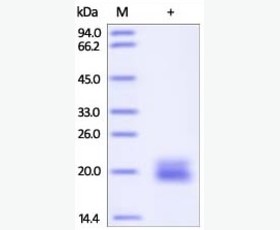Recombinant Mouse Semaphorin 4D/SEMA4D
| Product name: | Recombinant Mouse Semaphorin 4D/SEMA4D |
| Source: | Human Cells |
| Purity: | Greater than 95% as determined by reducing SDS-PAGE. |
| Buffer Formulation: | Lyophilized from a 0.2 μm filtered solution of 20mM PB,150mM NaCl,pH7.4. |
| Applications: | Applications:SDS-PAGE; WB; ELISA; IP. |
| Storage: | Avoid repeated freeze/thaw cycles. Store at 2-8 oC for one month. Aliquot and store at -80 oC for 12 months. |
| UOM: | 100ug/50ug/200ug/1mg/1g |
| Source | Human Cells |
| Description | Recombinant Mouse Semaphorin 4D is produced by our Mammalian expression system and the target gene encoding Phe24-Met711 is expressed with a Fc tag at the C-terminus. |
| Names | SEMA4D/Semaphorin-4D/M-Sema G/Semaphorin-C-like 2/Semaphorin-J/Sema J/CD100/Semacl2/Semaj |
| Accession # | O09126 |
| Formulation | Lyophilized from a 0.2 μm filtered solution of 20mM PB,150mM NaCl,pH7.4. |
| Shipping |
The product is shipped at ambient temperature. |
| Reconstitution |
Always centrifuge tubes before opening. Do not mix by vortex or pipetting. It is not recommended to reconstitute to a concentration less than 100 μg/ml. Dissolve the lyophilized protein in ddH2O. Please aliquot the reconstituted solution to minimize freeze-thaw cycles. |
| Storage |
Lyophilized protein should be stored at < -20°C, though stable at room temperature for 3 weeks. Reconstituted protein solution can be stored at 4-7°C for 2-7 days. Aliquots of reconstituted samples are stable at < -20°C for 3 months. |
| Purity |
Greater than 95% as determined by reducing SDS-PAGE. |
| Endotoxin | Less than 0.1 ng/µg (1 IEU/µg) as determined by LAL test. |
| Amino Acid Sequence |
FAPVPRLTWEHGEVGLVQFHKPGIFNYSALLMSEDKDTLYVGAREAVFAVNALNISEKQHEVYWK VSEDKKSKCAEKGKSKQTECLNYIRVLQPLSSTSLYVCGTNAFQPTCDHLNLTSFKFLGKSEDGK GRCPFDPAHSYTSVMVGGELYSGTSYNFLGSEPIISRNSSHSPLRTEYAIPWLNEPSFVFADVIQ KSPDGPEGEDDKVYFFFTEVSVEYEFVFKLMIPRVARVCKGDQGGLRTLQKKWTSFLKARLICSK PDSGLVFNILQDVFVLRAPGLKEPVFYAVFTPQLNNVGLSAVCAYTLATVEAVFSRGKYMQSATV EQSHTKWVRYNGPVPTPRPGACIDSEARAANYTSSLNLPDKTLQFVKDHPLMDDSVTPIDNRPKL IKKDVNYTQIVVDRTQALDGTFYDVMFISTDRGALHKAVILTKEVHVIEETQLFRDSEPVLTLLL SSKKGRKFVYAGSNSGVVQAPLAFCEKHGSCEDCVLARDPYCAWSPAIKACVTLHQEEASSRGWI QDMSGDTSSCLDKSKESFNQHFFKHGGTAELKCFQKSNLARVVWKFQNGELKAASPKYGFVGRKH LLIFNLSDGDSGVYQCLSEERVRNKTVSQLLAKHVLEVKMVPRTPPSPTSEDAQTEGSKITSKMP VASTQGSSPPTPALWATSPRAATLPPKSSSGTSCEPKMVDDIEGRMDEPKSCDKTHTCPPCPAPE LLGGPSVFLFPPKPKDTLMISRTPEVTCVVVDVSHEDPEVKFNWYVDGVEVHNAKTKPREEQYNS TYRVVSVLTVLHQDWLNGKEYKCKVSNKALPAPIEKTISKAKGQPREPQVYTLPPSREEMTKNQV SLTCLVKGFYPSDIAVEWESNGQPENNYKTTPPVLDSDGSFFLYSKLTVDKSRWQQGNVFSCSVM HEALHNHYTQKSLSLSPGK
|
| Background | SEMA4D is a member of the semaphorin family,contains one Ig-like C2-type domain, one PSI domain and one Sema domain. SEMA4D is strongly expressed in lymphoid tissues, especially in the thymus, as well as in the nervous tissues. However, SEMA4D is expressed at lower levels in testes, brain, kidney, small intestine, prostate, heart, placenta, lung and pancreas, but not in colon and liver. SEMA4D is a cell surface receptor for PLXN1B and PLXNB2 that plays an important role in cell-cell signaling. SEMA4D is involved in a number of fundamental biological processes such as promoting reorganization of the actin cytoskeleton, the migration of cerebellar granule cells and of endothelial cells and signaling via SRC and PTK2B/PYK2, which then mediates activation of phosphatidylinositol 3-kinase and of the AKT1 signaling cascade. Not only these, it plays a role in axonal growth cone guidance in the developing central nervous system. Semaphorin-4D / SEMA4D may play a functional role in the immune system, as well as in the nervous system. It could induce B-cells to aggregate and improves their viability (in vitro). SEMA4D is involved in regulating dendrite and axon branching and morphogenesis and promoting interaction with PLXNB1 mediates activation of RHOA. |














